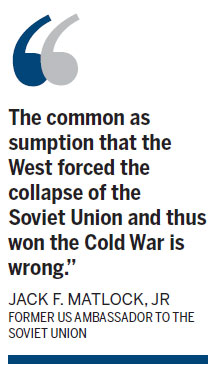The crisis over Crimea is more than a dispute over whether the strategic Black Sea peninsula should be considered Russian or Ukrainian. At its root is a deeper issue: Russia's simmering anger over its treatment by the West since the 1991 breakup of the Soviet Union.
Russia's biggest grievance has been the absorption into the NATO alliance not only of former socialist countries, such as Poland and Romania, but also the three former Soviet republics of Latvia, Lithuania and Estonia. The last straw was a move by the European Union to draw Ukraine closer to the West through a political association agreement. That set off a chain of events that led to the ouster of the Ukrainian president and, ultimately, to Crimean residents voting to join the Russian Federation.
Russian President Vladimir Putin recounted the post-Cold War history during a speech on Tuesday marking Crimea's accession to the Russian Federation, accusing the West of cheating Russia and ignoring its interests in the years that followed the Soviet breakup.
"They have constantly tried to drive us into a corner for our independent stance, for defending it, for calling things by their proper names and not being hypocritical," Putin said. "But there are limits. And in the case of Ukraine, our Western partners have crossed a line. They have behaved rudely, irresponsibly and unprofessionally."
There is an understanding that among Western observers and students of East-West relations that the Ukraine crisis marks a Kremlin decision that more than "twenty years of trying to develop a better relationship with the West has been a failure", said Keith Darden, a professor of international service at American University.

Moscow's rapid takeover of Crimea, said Jack F. Matlock, Jr, a former US ambassador to the Soviet Union, must be understood in the context of how Washington has handled relations with Moscow since the breakup of the Soviet Union.
"The common assumption that the West forced the collapse of the Soviet Union and thus won the Cold War is wrong. The fact is that the Cold War ended by negotiation to the advantage of both sides," Matlock wrote on the Washington Post opinion page. Since the Soviet breakup, he said, the problem is that the US has "insisted on treating Russia as the loser".
NATO's move into the Baltic countries and the Balkans was "the diplomatic equivalent of swift kicks to the groin", he wrote.
Russia's strategic and emotional ties to Crimea are especially deep. The Kremlin views Ukraine as essential to its attempts to establish a Eurasian Commission modeled after the European Commission, the governing arm of the EU. The majority of Crimea's population is ethnic Russian and the Kremlin has a long lease on a base there for its ultra-important Black Sea Fleet. Tens of thousands of Russian military personnel were already stationed on the peninsula. Russia also has deployed a big force opposite Ukraine's eastern border, the industrial heartland with a big Russian-speaking population.
Western and central Ukraine, on the contrary, are more oriented toward the EU and NATO.